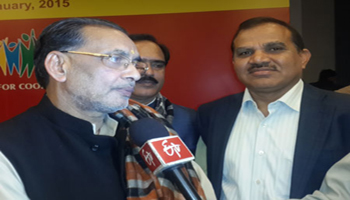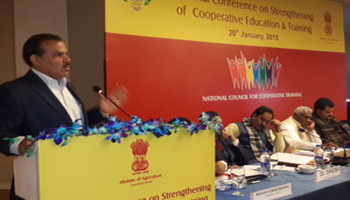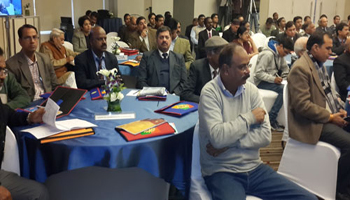

Minister was direct and also brilliant as he minced no words and said things possibly not very pleasing to the cooperative officials. If he took on cooperative leaders in his first meeting during the NCUI’s Valedictory function, it was now the turn of cooperative officials to be cautioned sternly against their foreign jaunts and not focusing on training programs.” Go and sit at the bench at Patna ICM and see if they are worth it. We are ready to lend all help but would expect performance from you at the end of the day, ‘Singh said pointedly to NCUI’s Chief Executive Dr Dinesh who also happens to be the DG of the NCCT.
The meeting was well attended as three state cooperative ministers along with Registrars and Principal Secretaries from states had come. MDs and CEOs of several national level cooperative federations along with the NCUI President Chandra Pal Singh, Vice-Chairman G H Amin and Biscomaun Chairman Sunil Singh made it to the event.
Co-operative is part of our life since time immemorial and Britishers made it a structured organization in 1904. In the last 110 years India has become the centre of global cooperative movement. The farmers of Khera in Gujarat were not allowed to open cooperative by Britishers who feared that poor farmers cannot handle it. It led to a revolt led by Tribhuvandas Patel and Khera became the first village to ignite a dairy revolution where even former Prime Minister Lal Bahdur Shastri had paid a visit, recounted Mr Singh. 

Emphasizing on the role training plays the Minister said that” if the members and official are trained well, the hold of middlemen as well as obstinate leadership on the levers of power in cooperative organizations could be weakened. PACS Chairman often thinks it’s a life-time job and would not budge from his post. I have never been part of active cooperative leadership but I have fought one or two elections and I know how cooperatives operate at lower level, though I am not equally good to understand its working at higher level,” Radha Mohan Singh said to an enthralled audience.
He asked state representatives to focus on training of small officials as it is a state subject. Lauding VAMINICOM the Minister wanted to have more such institutions in north and south India. Expressing satisfaction at the fact that NCDC has taken up computerization of all the cooperative organizations in the country he said what matters ultimately again is execution be it NCDC or NCCT.
The Minister also referred to the 97th amendment and said what is pending before the apex court is not the provisions of the act but the fact that state consent was not sought beforehand. States meanwhile are free to implement the 97th amendment as Centre is ready with a robust reply, he added.
He also addressed the concern about chit fund companies trying to masquerade as multi state societies. We have decided to give multi state status only after an NOC from the state, Mr Singh said. He also did not forget to admire Prime Minister Narendra Modi and said he had a common man’s dream in his heart and he realized the same in his 14 years rule in Gujarat. He has helped 23 cooperative banks at one go soon after taking over and has decided to re-start defunct fertilizer plants to meet the challenge of shortage.
That is because we believe in the cooperative model and if fails to deliver you can rest assured it has fallen into wrong hands, he warned. Honest execution alone is the answer and I will mostly dwell on this theme today, he concluded.
Before him, NCUI President Chandra Pal Singh made a speech. Welcoming the chief guest Shri Radha Mohan Singh, Yadav called for adoption of cooperative at least as a chapter in 10th or 12th. How can we network with young generation if they have no idea about it, he rued. Being a state subject the states have to plan for training the people and we are there with full support, he added.
In order to lend importance to cooperative training and education NCUI President also raised the issue of employing only diploma or degree holders in cooperative organizations.














































Situation of “Cooperatives demand fund from the government” must be eliminated forthwith by an ordinance if necessary. Have a good look at the new directive principle of State Policy (Article 43B) namely that the State shall endeavour to promote voluntary formation, autonomous functioning, democratic control and professional management of co-operative societies” the Parliament laid down under 97CAA. In what way any one surmises that the Parliament expected (in 97CAA) States to fill up coffers of cooperatives to help them succeed?
The first step: The Parliament should totally prohibit States giving financial aids to any cooperative society whatsoever. Ask the States to devise non-monetary aids so that the Cooperative Sector can become substantially a “corruption free affair” as the state moneys are no body’s money and of every body’s, who has the kneck of funneling out of the well intended stream.
Let the state play the wholly non-monetised catalyst role. The onus of the State Staff is to help ( using skill and administrative experience) the societies to operate efficiently so as to derive maximum benefits out of the efforts of the members themselves. State Staff is rewarded from state Funds ( after discontinuing financial aids),based on targetted performance achieved by the societies allotted to each one of them. State moving over to this concept, will rightly address a very genuine concern expressed by the Union Minister namely “To make a success of it entails a truthful execution of programs and officials leaving the comforts of their offices to experience things at the grassroots level.” The State Official’s mandate is “debottlelekecking” of processes in which their own fraternity is engaged. Cooperatives are prohibitted from remunerating the officials.
i am strictly against the funding to cooperatives because till now it always into the hands of rich people and they used it as they need for the money laundring & corruption no of examples are there they just use it as money making machine and in any way no poor/commn man is getteing bennefitted from it.